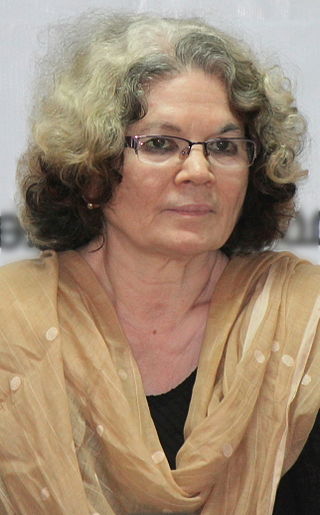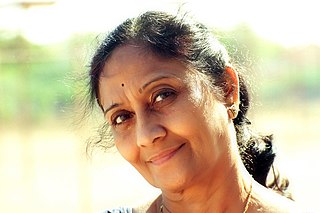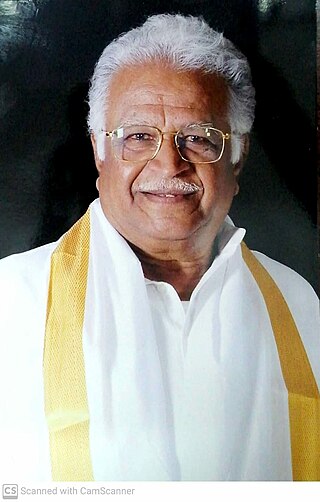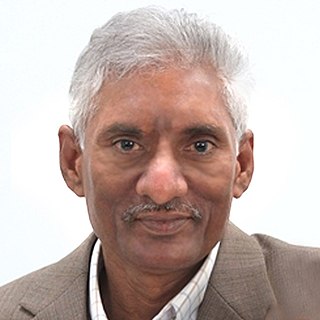Related Research Articles

Pratibha Ray is an Indian academic and writer of Odia-language novels and stories. For her contribution to the Indian literature, Ray received the Jnanpith Award in 2011. She was awarded the Padma Bhushan in 2022.

Leela Nambudiripad, known by her pen name Sumangala, was an Indian author of children's literature in Malayalam. Some of her notable works included Neypaayasam, Mithayippoti, as well as translations of the Panchatantra into Malayalam.

Sugathakumari was an Indian poet and activist, who was at the forefront of environmental and feminist movements in Kerala, India.

Shashi Deshpande is an Indian novelist. She is a recipient of the Sahitya Akademi Award and the Padma Shri Award in 1990 and 2009 respectively.

The Sahitya Akademi Award is a literary honour in India, which the Sahitya Akademi, India's National Academy of Letters, annually confers on writers of the most outstanding books of literary merit published in any of the 22 languages of the 8th Schedule to the Indian constitution as well as in English and Rajasthani language.

Ashapurna Devi, also Ashapoorna Devi or Ashapurna Debi, was a prominent Indian novelist and poet in Bengali. In 1976, she was awarded the Jnanpith Award and Padma Shri by the Government of India, D.Litt. by the Universities of Jabalpur, Rabindra Bharati, Burdwan and Jadavpur. Vishwa Bharati University honoured her with Deshikottam in 1989. For her contribution as a novelist and short story writer, the Sahitya Akademi conferred its highest honour, the Sahitya Akademi Fellowship, in 1994.

Dr. 'Ampasayya' Naveen is a Telugu novelist. He is an Osmania University alumni, and his college life at OU inspired his first novel, Ampasayya. His novel Kala Rekhalu won the Sahitya Academy Award in 2004.

Ranganayakamma is an Indian Marxist writer and critic. The main theme in her works is gender equality and the depiction of women's family life in India.
Sivaraju Venkata Subbarao, known by his pen name Butchi Babu, was an Indian short story writer, novelist and painter known for his works in Telugu literature.

Sarah Joseph is an Indian novelist and short story writer in Malayalam. She won the Kendra Sahitya Akademi Award and the Vayalar Award for her novel Aalahayude Penmakkal. She is a leader of the feminist movement in Kerala and is the founder of the activist organization Manushi. She joined the Aam Aadmi Party in 2014 and contested the 2014 parliament elections from Thrissur Lok Sabha constituency.

K. R. Meera is an Indian author and journalist, who writes in Malayalam. She was born in Sasthamkotta, Kollam district in Kerala. She worked as a journalist in Malayala Manorama but later resigned to concentrate more on writing. She started writing fiction in 2001 and her first short story collection Ormayude Njarambu was published in 2002. Since then she has published five collections of short stories, two novellas, five novels and two children's books. She won the Kerala Sahitya Akademi Award in 2009 for her short-story, Ave Maria. Her novel Aarachaar (2012) is widely regarded as one of the best literary works produced in Malayalam language. It received several awards including the Kerala Sahitya Akademi Award (2013), Odakkuzhal Award (2013), Vayalar Award (2014) and Kendra Sahitya Akademi Award (2015). It was also shortlisted for the 2016 DSC Prize for South Asian Literature.

Mridula Garg is an Indian writer who writes in Hindi and English languages. She has published over 30 books in Hindi – novels, short story collections, plays and collections of essays – including several translated into English. She is a recipient of the Sahitya Akademi Award.

Varsha Mahendra Adalja is an Indian Gujarati language feminist novelist, playwright and negotiator who won the 1995 Sahitya Akademi Award for Gujarati language for her novel Ansar. She is also a dramatist, writing for stage plays, screenplays, and radio.

Vijayalakshmi is a Malayalam–language poet from the South Indian state of Kerala.

Kolakaluri Enoch is an Indian writer, teacher, and former Vice Chancellor of Sri Venkateswara University, Tirupati. He was honoured by the Government of India, in 2014, by bestowing on him the Padma Shri, the fourth highest civilian award, for his contributions to the field of literature.

Popuri Lalita Kumari, popularly known by her pen name Volga, is Telugu poet and writer well known for her feminist perspective. She won the prestigious Sahitya Akademi Award in 2015 for her short story compilation 'Vimukta Kadha Samputi' in Telugu. Along with being a writer, she has also been a professor and head of scripting division in Tollywood. Her work initiated debates across the country about feminism, in times when the idea was hardly accepted. The Library of Congress has a collection of her most popular published works, including the English translations of selected short stories.

Dr. Papineni Sivasankar, a doyen of Modern Literature in Telugu, recipient of Sahitya Akademi Award, 2016 is an Indian poet, short story writer, and critic.
Illindala Saraswati Devi was a Telugu novelist, short story writer, biographer, essayist and social worker from Andhra Pradesh, India. She received the Sahitya Akademi Award in 1982 for her short story collection, Swarnakamalalu.
Razia Sajjad Zaheer was an Indian writer in the Urdu language, a translator, and a prominent member of the Progressive Writers Association. She won the Uttar Pradesh Sahitya Akademi Award as well as the Soviet Land Nehru Award.

Sithara S. is an Indian feminist writer in Malayalam from Kerala. In her short stories and novels she has highlighted women's issues, gender conflict and lesbian rights. In 2004 she won Sahitya Akademi Golden Jubilee Award for her contributions to Indian literature She is also a translator from Malayalam to English and vice versa.
References
- 1 2 3 4 5 Sikdar, Prabeer (19 December 2013). "Kendra Sahitya Akademi for Katyayani Vidmahe". Deccan Chronicle. Retrieved 21 September 2021.
- 1 2 3 "Sahitya Akademi award for Katyayani Vidmahe". The Hans. 19 December 2013. Retrieved 21 September 2021.
- 1 2 3 4 "Sahitya Akademi Award for KU Prof". The New Indian Express. 19 December 2013. Retrieved 21 September 2021.
- 1 2 3 4 "Telugu writer Katyayani Vidmahe returns Sahitya Akademi award". Business Standard India. 18 October 2015. Retrieved 21 September 2021.
- ↑ Vijayasree, C.; Sridhar, M.; Sengupta, Mahasweta (20 May 2018). Colonial Encounter: Telugu–English Literary and Cultural Interface. Taylor & Francis. ISBN 978-0-429-88470-2.
- ↑ "Dont die, live & fight against suppression". The Hans. 30 January 2016. Retrieved 23 September 2021.
- ↑ "Women must not be portrayed as mere commodities: Katyayani Vidmahe". The Hans. 24 December 2014. Retrieved 21 September 2021.
- 1 2 "Kashinath Singh, Katyayani Vidmahe return Sahitya Akademi awards". The Hindu. 18 October 2015. ISSN 0971-751X . Retrieved 21 September 2021.